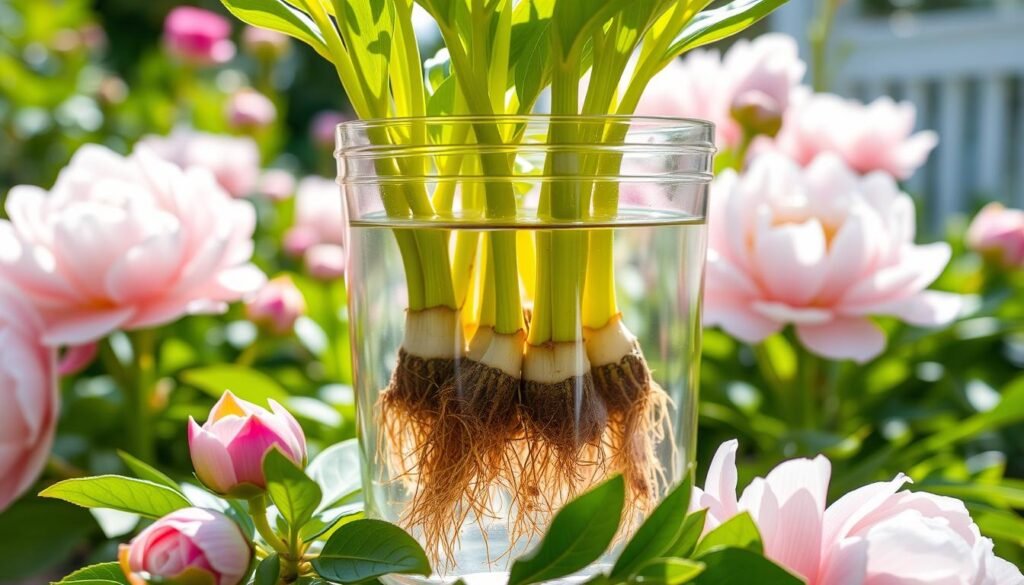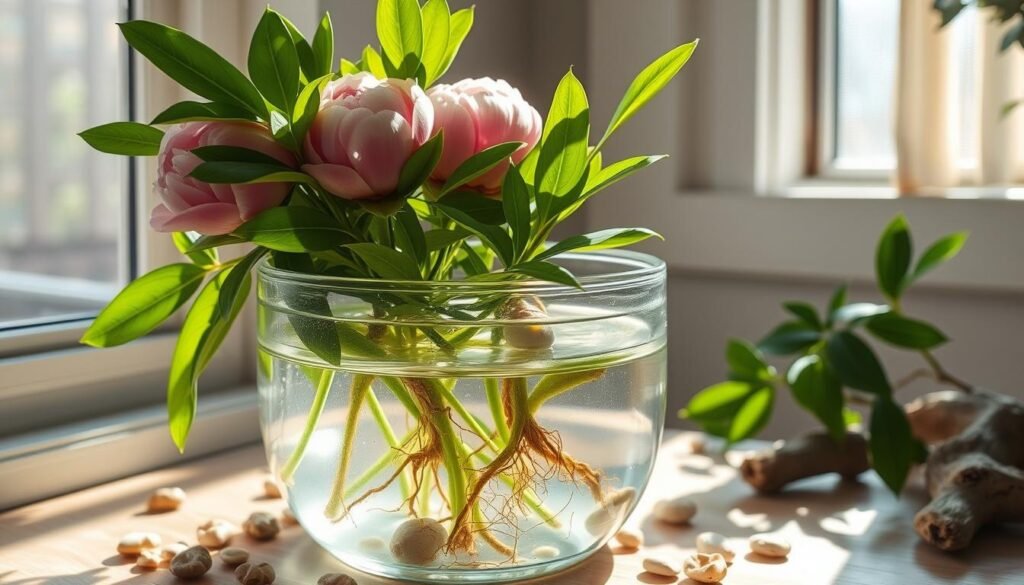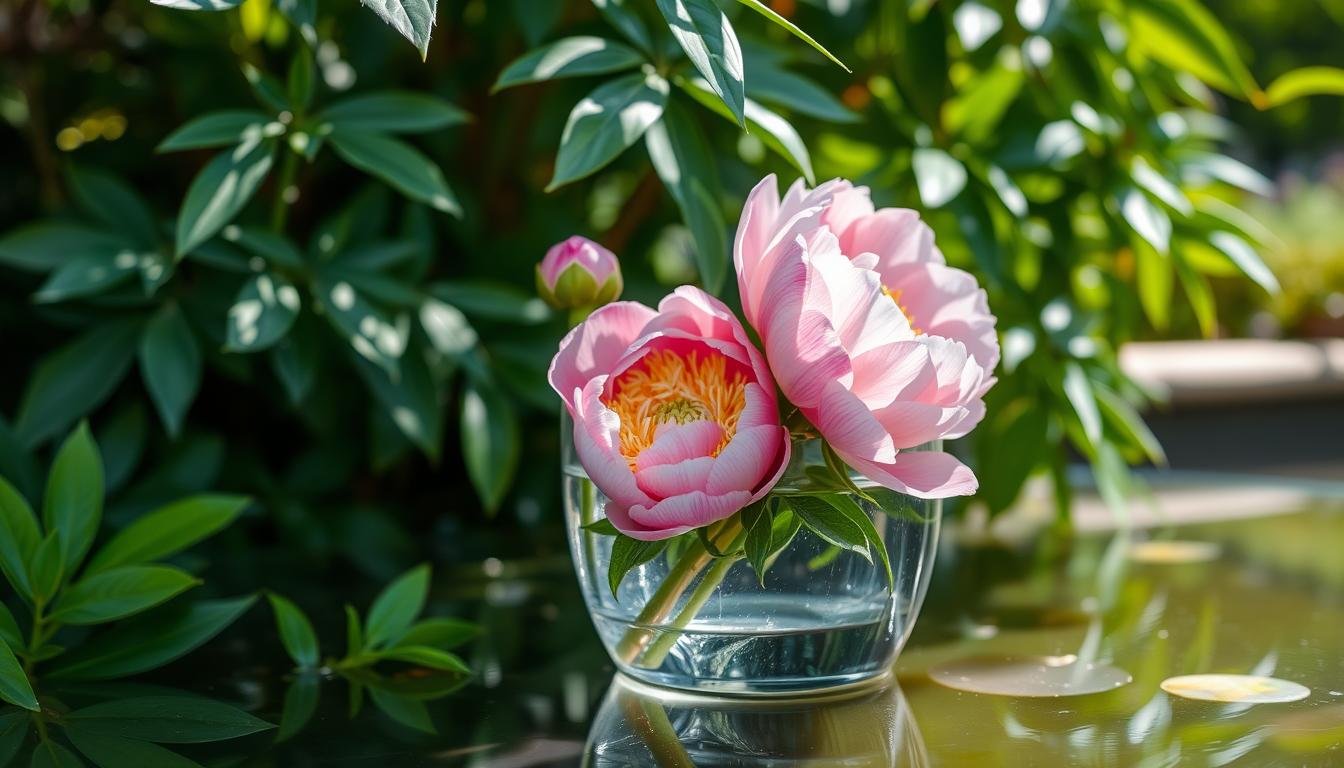Yes, you can root peony cuttings in water. Many gardeners have successfully used this method, observing healthy growth after a period of time in water.
Gardening is more than a hobby; it’s a journey of patience and discovery. I remember seeing peonies for the first time. Their bright blooms promised a beautiful summer. A friend accidentally broke a peony stem, but instead of throwing it away, she put it in water.
To our surprise, it started growing roots after two weeks. This made me wonder: can you root peony cuttings in water? I’ll share what I’ve learned about rooting peony stems. We’ll see if this method could be a secret for gardeners.
Key Takeaways
- Most herbaceous peonies grow about three feet tall and three to four feet wide.
- Peonies are generally hardy from zone 3 to zone 8.
- Peony propagation involves creating new plants from one healthy peony plant.
- The best time for dividing peonies is typically late summer through early autumn.
- Not all peony cuttings readily root through the method of root cuttings.
- Peonies prefer full sun for at least six hours a day.
- It may take several weeks to months for a peony cutting to successfully root.
Table of Contents
Understanding Peonies and Their Propagation
Peonies are amazing plants with beautiful flowers and a lovely scent. They belong to the genus Paeonia. There are many types, each with its own look and growth. Knowing about these types is key to growing peonies well.
The Different Types of Peonies
Peonies are mainly two types: herbaceous and tree peonies. Herbaceous ones, like ‘Sarah Bernhardt,’ die back in winter. They bloom again in spring. Tree peonies, like ‘Shirley Temple,’ stay green all year.
Both types need different ways to grow. I can try growing them from cuttings or by dividing roots. This helps me grow more peonies in my garden.
Why Propagate Peonies?
There are many reasons to grow peonies. I can add new plants to my garden or try new hybrids. Sharing these plants with friends is also a joy.
But, it takes patience. Improvements may take time, especially when moving or dividing plants.
When I grow peonies, I need to watch the soil, water, and timing. Taking cuttings in late spring or dividing roots in early fall helps. Growing them from seeds also works, but I need to prepare them first. With the right care, my peony garden will bloom beautifully.
What Is Plant Propagation?
Plant propagation is making new plants from old ones. It’s key in gardening. It helps gardeners grow more plants, keep certain traits, and make their gardens look better. Learning how to propagate peonies can make your garden more colorful.
The Importance of Plant Propagation Techniques
Using the right plant propagation methods is crucial. There are many ways to do it, each with its own benefits and challenges. When growing peonies, picking the right time is important. They take a few years to grow fully.
By propagating peonies well, you keep their good traits. It also lets you grow more without buying new plants.
Common Methods for Propagating Peonies
There are several good ways to propagate peonies. The best one is division. This means splitting the roots to make new plants. It works well in the fall, after the first frost.
Other methods include:
- Root cuttings: This method, liked by 25% of growers, uses pencil-thick roots for better growth.
- Sowing seeds: Planting seeds in August or September can be exciting. But, it takes years for peonies to bloom.
- Taking cuttings: For shrub peonies, cut 10 to 15 cm young shoots. Plant them in moist soil.
Good care is key for successful propagation. Peonies need about 1 inch of water a week after planting. Knowing about problems like root rot and fungal diseases helps too.
By using these methods and knowing their details, I can make my peony garden grow and get more diverse.
Can You Root Peony Cuttings in Water?

Many gardeners like rooting peony cuttings in water. It’s simple and lets them see roots grow. This method is different from soil and can be more fun.
Why This Method Is Considered
Rooting peonies in water has big benefits. It’s easy and doesn’t worry about soil or pests. Some peonies, like P. rockii, grow better in water.
Success Stories and Testimonials
Many gardeners have tried rooting peonies in water. They share their stories of success. Suzanne, for example, saw roots in just two weeks.
Studies show water works well for many plants. Rooting peonies in water can be rewarding. It takes patience, sometimes weeks or months, to see roots grow.
Preparing to Root Peony Cuttings
To start growing peonies from cuttings, I must think about a few key things. The time we take the cuttings is very important. Late summer or early fall is the best time.
This time lets the plant have enough energy before winter. It helps the cuttings grow roots better.
Choosing the Right Time
Finding the right season for taking cuttings is key. Late summer is perfect because the plant is getting ready for sleep. This means the cuttings have a better chance to grow roots.
Knowing when to take the cuttings is very important. It affects how well the peonies will bloom later.
Gathering Necessary Tools and Materials
Before I start rooting, I need to get my tools ready. Here’s what I’ll need:
- Sharp pruning shears
- Clean containers or glass jars for water
- Rooting hormone (optional, but recommended)
- Labels for identifying cuttings
Using clean and sharp tools helps avoid infections or damage. If I use rooting hormone, it can help the cuttings grow roots faster. Having everything ready makes the rooting process smoother.
With the right timing and tools, I’m ready for the next steps. Knowing about seasonal changes and having the right tools is crucial for growing quality peony cuttings. For more tips, I look at experiences from other gardeners. Their advice helps me improve my gardening skills.
Step-by-Step Guide to Rooting Peony Cuttings in Water
Rooting peony stems in water is a great way to grow these lovely plants. I’ll show you how to pick the right stems and cut them correctly. This will help your plants grow strong and healthy.
Selecting Healthy Stems
Picking the right stems is key to propagating peonies. I look for semi-hardwood stems that are 6-8 inches long. They should be pencil-sized and have at least two to three nodes for root growth.
- Length: Aim for cuttings that are 6-8 inches long.
- Thickness: Stems should be pencil-sized—thin, weak stems generally do not root well.
- Nodes: Look for stems with at least two to three nodes, as these will be essential for root development.
Proper Cutting Techniques
Cutting the stems right is important for successful rooting. Here’s how to do it:
- Use clean pruning shears to make a 45-degree angle cut. This increases the surface area for water absorption.
- Make your cut just below a node since this is where the roots are likely to sprout.
- Remove any lower leaves to prevent rotting in the water. Keep a couple of leaves at the top to support photosynthesis.
After cutting, put your stems in a clean water container. Make sure at least one node is underwater. Change the water every week to keep it fresh. Keep the cuttings in a warm spot (70-80°F) for 8-12 weeks. Watch for new growth to see if your peonies are rooting well.
Tips for Successful Rooting

Rooting peony cuttings needs careful attention. Keeping water conditions right is key for healthy roots. This section will share tips for water care and stress reduction. Using these methods can help your peonies grow strong and beautiful.
How to Maintain Water Conditions
Optimal water conditions are crucial for rooting. Here are some helpful tips:
- Keep water temperature between 60-70°F. This helps roots grow better.
- Change water often to avoid stagnation and keep it clean. This reduces disease risk.
- Use a clear container to see root growth. Make sure it gets enough light but not too much.
- Keep water pH slightly acidic to neutral (6.0 to 7.0). This is good for peony cuttings.
Minimizing Stress on Cuttings
Reducing stress on cuttings is also key. Here are some strategies:
- Pick healthy stems for cuttings. Choose lengths of 4-6 inches for better adaptation.
- Use sharp pruning shears to avoid harming the cuttings.
- Apply rooting hormone to the cut ends. It helps roots grow faster and stronger.
- Give cuttings indirect sunlight or dappled shade. This protects them from too much heat and encourages growth.
Following these tips will help keep water conditions right and reduce stress on cuttings. This will lead to strong roots and beautiful blooms in the future.
Alternative Methods for Rooting Peonies
Exploring ways to propagate peonies can make gardening more fun. Rooting in water is common, but soil has its own perks. The right method can make a big difference in how well your plants grow.
Using Soil for Cutting Rooting
Soil rooting is a solid way to grow peonies. It’s important to use soil that drains well to prevent rot. Here’s how to do it:
- Choose a healthy cutting of about 4-6 inches long from a mature peony.
- Dip the cut end in rooting hormone to stimulate root growth.
- Plant the cutting at a depth of about two inches in the soil.
- Water moderately to provide moisture without waterlogging the soil.
Keeping an eye on soil moisture and light can help your cuttings grow. This method lets you watch your plant grow from the start.
Taking Root Cuttings instead of Stem Cuttings
Root cuttings are great for growing specific peony types. This method takes roots from established plants. It’s a good way to get true copies of the parent plant. Here’s how to do it:
- Dig up the peony plant carefully, ensuring minimal damage to the roots.
- Select sturdy roots, ideally those with multiple crown buds.
- Cut pieces that are approximately 6 inches long and contain at least three eyes.
- Replant these cuttings about two inches deep in well-prepared soil.
This method can lead to flowering peonies in one to two years. It’s faster than growing from seed. It’s a great way to share beautiful flowers with other gardeners.
| Method | Time to Flower | Success Rate |
|---|---|---|
| Using Soil for Cutting Rooting | 1-2 years | High |
| Taking Root Cuttings | 1-2 years | Very High |
| Growing from Seed | 3-4 years | Variable |
Using these methods can help you grow beautiful peonies. For more tips on growing plants, check out this resource: Birds of Paradise Plant Care.
Caring for Established Peony Cuttings
Once peony cuttings have rooted, it’s time to care for them. This is key for their growth and health. I’ll share how to transplant them into soil and help them grow.
Transplanting into Soil
Transplanting needs careful thought. Remove the roots gently to avoid damage. Plant them in well-draining soil with compost for nutrients.
When transplanting, plant them 1-½ to 2 inches deep. Space them 2 feet apart in rows, and rows 3 feet apart. This helps with air flow and prevents disease.
Nurturing New Growth
After transplanting, new growth needs care. Peonies need 6-8 hours of sunlight daily. Balancing light and water is also important.
Check soil health with tests. This helps you adjust the soil for your peonies. Remove flower buds for the first three years to focus on root growth. This makes the plants strong.
| Plant Care Aspect | Recommended Practices |
|---|---|
| Soil Type | Well-draining, amended with compost or organic matter |
| Depth for Planting | 1-½ to 2 inches below the soil surface |
| Spacing | 2 feet apart within rows, 3 feet between rows |
| Sunlight | 6-8 hours of direct sunlight |
| Irrigation | Maintain adequate moisture levels; irrigate as necessary |
By following these steps, your peonies will bloom beautifully. For more peony care tips, visit here.
Common Challenges and Solutions
Even the most careful gardener might face problems when trying to root peony cuttings. I’ve seen issues like rotting cuttings and poor growth signs that need quick action. Knowing these problems helps find solutions for a successful process.
Dealing with Rotting Cuttings
Rotting cuttings are a big challenge. They often happen because of too much water or bad soil. Here are a few ways to fix this:
- Make sure cuttings are in containers that drain well.
- Don’t water too much; let the soil dry a bit between waterings.
- Use clean, sharp tools to avoid spreading diseases.
- Keep an eye on how wet the soil is and change how often you water.
Recognizing Poor Growth Signs
Spotting poor growth early can stop bigger problems. Look out for these signs:
- Yellow leaves mean too much water or not enough nutrients.
- Wilting cuttings might mean not enough water or root problems.
- Pests like Hoplia beetles can harm flowers fast.
Watching for these signs helps me fix issues like watering or pests quickly.
| Challenge | Possible Causes | Solutions |
|---|---|---|
| Rotting Cuttings | Overwatering, Poor drainage | Use well-draining soil, Adjust watering schedule |
| Poor Growth Signs | Yellowing, Wilting | Modify nutrients, Inspect for pests |
By watching closely and acting fast, I can do better at growing peonies. With the right knowledge and flexibility, gardening challenges can be overcome.
Conclusion
Rooting peony cuttings in water is not only possible but also rewarding. This article covered many topics, from peony nature to growing tips. It shows that growing peonies is not just about the method but also loving gardening.
Peonies need patience and care, especially because they grow slowly. Starting this journey, remember that peony seeds can stay good for years. With the right care, you’ll see these plants change beautifully.
Sharing your success or learning from others is key in gardening. I suggest trying different ways to grow peonies. This lovely plant can make your garden and home beautiful, brightening your days for years.




